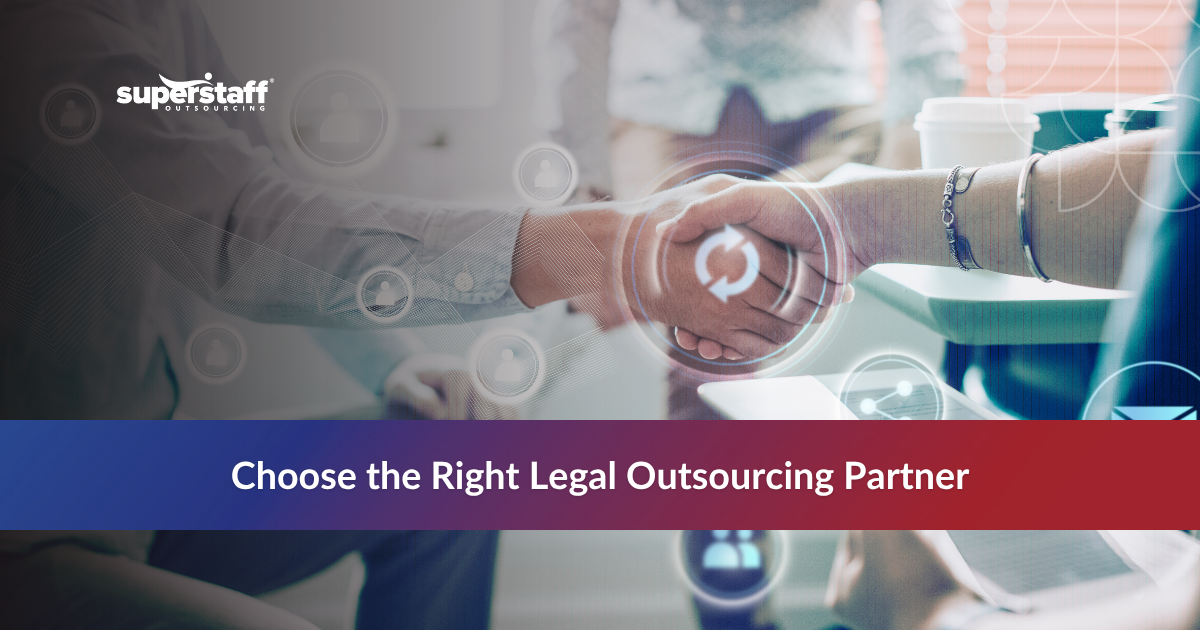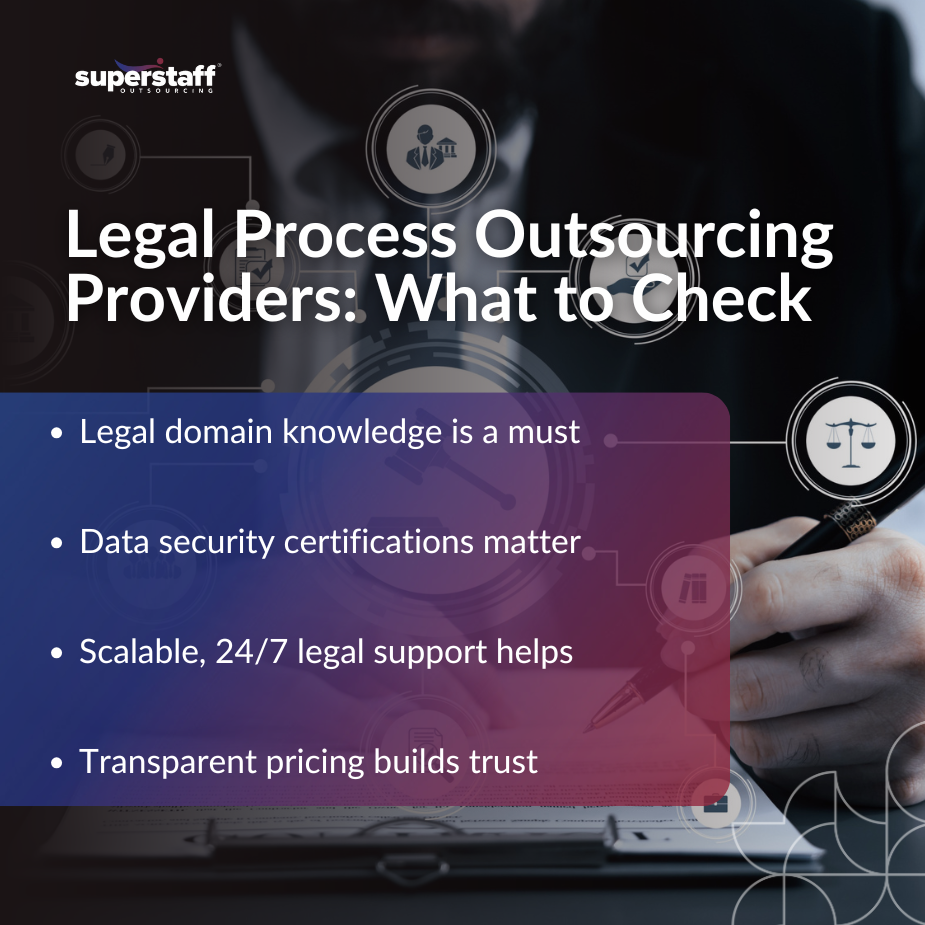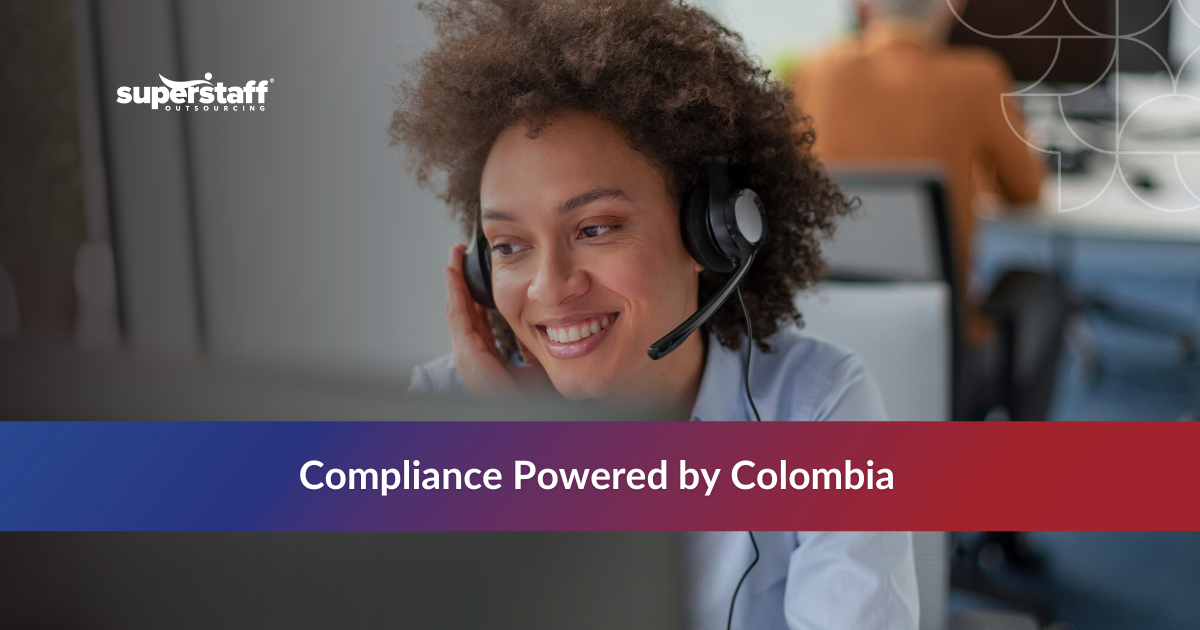
Legal work demands precision, confidentiality, and deep expertise — outsourcing it isn’t a light decision. With mounting caseloads, rising operating costs, and the growing need for round-the-clock legal support, legal process outsourcing (LPO) has become a practical option for many corporate legal departments and law firms. Still, not all legal process outsourcing providers deliver the caliber of service required in this high-stakes industry. This blog offers a decision-maker’s checklist that can help you confidently evaluate potential partners and find one that meets your specific standards.

Domain-Specific Legal Expertise Isn’t Optional — It’s Foundational
You wouldn’t hire a criminal lawyer for a corporate merger. The same logic applies to legal process outsourcing providers. Domain expertise is critical. Whether your needs fall into corporate governance, litigation support, intellectual property, contract review, or regulatory compliance, your LPO partner should have a proven track record in that area. Without relevant knowledge, even the most well-staffed provider will slow down workflows or introduce costly errors.
If you’re managing multi-jurisdictional matters, make sure the team understands the legal frameworks and terminologies applicable to your region. Some legal process outsourcing providers specialize in U.S. law, others in U.K. or EU regulatory landscapes. This distinction matters when reviewing or drafting contracts or preparing discovery for cross-border litigation.
More importantly, inquire about their internal bench strength. Are certified attorneys or paralegals part of the team? Do they have prior experience working within your industry — such as finance, healthcare, or tech — where legal nuances can be highly specific? These questions can surface the true level of specialization and determine whether the provider is a good fit or simply trying to stretch their capabilities.
Data Security and Compliance Should Never Be Afterthoughts
Legal departments handle privileged information, trade secrets, intellectual property, and regulatory data — in other words, the kind of information that, if leaked, could devastate a company’s reputation and finances. That’s why your chosen legal process outsourcing providers must demonstrate airtight data security.
Ask about their certifications and compliance frameworks. ISO 27001, SOC 2, and GDPR compliance are standard requirements for any serious LPO. But it doesn’t stop at credentials. Dig deeper: What encryption standards do they apply? How is data transferred and stored? Are there strict access controls and layered authentication systems in place?
Legal process outsourcing providers should also have clear protocols for confidentiality training. All team members handling client files should sign NDAs and undergo mandatory, recurring security education. This is especially important in offshore models, where employees operate in different regulatory environments. Trust in a provider is earned not by their promises, but by the rigor of their practices.
Speed, Scalability, and Workflow Integration Are Deal Breakers
Even the most experienced LPO provider won’t be much help if they can’t meet your deadlines. Legal work isn’t just complex — it’s time-sensitive. Whether you’re responding to regulatory filings, managing mergers, or handling discovery, delays can derail outcomes. That’s why legal process outsourcing providers need to be both agile and well-integrated into your internal workflow.
Do they offer 24/7 operations or follow-the-sun staffing? Around-the-clock availability allows your legal operations to continue even after your in-house team logs off. It also ensures that high-priority items can be escalated and resolved without timezone delays.
Equally important is how seamlessly they work with your existing tools. Are they familiar with your document management system, contract lifecycle platform, or eDiscovery software? Can they plug into your current process or do they require you to adapt to theirs? Legal process outsourcing providers should make your life easier — not introduce new friction.
Another important test: Ask how they handle peak periods. Can they quickly scale the team when litigation volume spikes or new regulations drive up compliance workload? Scalability is often the difference between providers that merely support and those that truly empower.
People Behind the Process: Vetting Talent and Quality Control
Legal success comes down to execution — and execution is driven by people. That’s why evaluating the recruitment, training, and quality assurance practices of legal process outsourcing providers is just as important as assessing their technology and structure.
Start with recruitment. Are candidates sourced from top law schools or with relevant paralegal certifications? How much prior experience is expected? You want to understand the minimum standard — not just the best-case scenarios.
Training is another lens into quality. Do legal process outsourcing providers offer role-specific onboarding, compliance modules, and continual legal education? A well-trained team performs better and requires less oversight from your end.
Finally, examine how they define and track quality. Do they use double-review systems? Is work audited regularly? Are mistakes logged and resolved in a systematic way? Ask whether they track performance metrics such as accuracy rate, revision turnaround, or contract completion time. Transparency in quality assurance is often what separates high-performing providers from generic service vendors.
Transparency in Pricing, Communication, and Governance
Many LPO relationships falter not because of competence but because of unclear expectations. That’s why transparency in pricing, service level agreements (SLAs), and communication is vital when evaluating legal process outsourcing providers.
Start with cost models. Are you billed hourly, per document, or based on volume? Is there a base retainer? While pricing can vary depending on scope, it should always be clear, consistent, and aligned with the value delivered. Hidden fees or vague line items are red flags.
Communication also matters. Will you have a dedicated account manager? Is there a documented escalation path if timelines slip or quality dips? Legal process outsourcing providers that establish structured governance protocols tend to deliver more reliable results.
You should also ask about performance tracking. Are SLAs reviewed weekly, monthly, or quarterly? What happens when benchmarks are missed? Some of the best LPO providers create collaborative dashboards or reporting tools so both sides stay aligned — a must-have if you’re managing complex legal workflows at scale.
A Decision-Ready Checklist for Choosing the Right Partner
Choosing between multiple legal process outsourcing providers can be overwhelming — which is why it helps to use a practical checklist. Here’s a 10-point evaluation framework to simplify your selection process.
Start with legal expertise. Does the provider specialize in your area of law and understand your jurisdiction? Then assess security: are they certified and compliant with global data privacy standards? Next, look into workflow compatibility and turnaround time — can they match your internal pace and integrate with your systems?
Evaluate scalability. Do they have the ability to flex staffing as your caseload grows? Review their QA methodology to ensure your output remains consistent. Look into pricing clarity and make sure SLAs and KPIs are documented and reviewed regularly. Strong communication, dedicated support, and industry experience should round out your top considerations.
This checklist doesn’t just help you compare options — it forces clarity. It brings rigor to what is often an overly generalized procurement process and helps you find a provider that delivers lasting legal value, not just short-term cost savings.
Conclusion: Choosing the Right Legal Process Outsourcing Providers
Selecting legal process outsourcing providers is one of the most important operational decisions a modern legal department or firm can make. The stakes are high, and the variables are many — from data protection and domain knowledge to turnaround time and communication frameworks. But with a structured, criteria-based approach, legal leaders can make informed, confident choices.
This blog offers a straightforward way to assess and compare LPO providers through a mix of legal domain expertise, security, scalability, transparency, and people-first execution. You now know how to evaluate legal process outsourcing companies checklist-style — with clarity, confidence, and a focus on what truly matters to your business.
At SuperStaff, we understand the stakes. Our legal process outsourcing solutions are built for precision, confidentiality, and compliance — because we know it’s not just about saving costs, it’s about protecting what matters. If you’re looking for an LPO partner you can trust, let’s talk.






